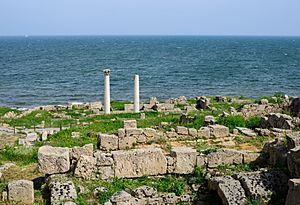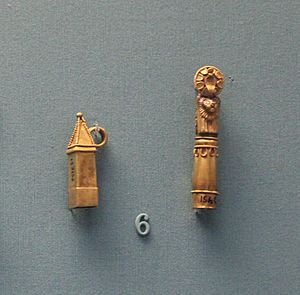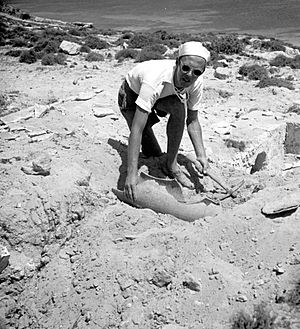Tharros facts for kids

View of Corinthian columns at Tharros
|
|
| Lua error in Module:Location_map at line 420: attempt to index field 'wikibase' (a nil value). | |
| Type | Settlement |
|---|---|
| History | |
| Founded | Eighth century BCE |
| Cultures | Nuragic civilization, Punic civilization, Roman civilization |
| Site notes | |
| Condition | Ruined |
| Management | I Beni Culturali della Sardegna |
| Public access | Yes |
| Website | official website: https://www.tharros.sardegna.it/en/ |
Tharros (also called Tharras) was an ancient city on the west coast of Sardinia, Italy. Today, it is an important archaeological site. You can find it near the village of San Giovanni di Sinis, close to Cabras. Tharros was once a very important place on the island.
Contents
History of Tharros
How Tharros Began
For a long time, experts thought that people from Phoenicia started the city of Tharros around 800 BC. But new discoveries have changed this idea. Archaeologists found parts of an older settlement in the Mistras Lagoon. A 100-meter wall found underwater might be from a port built much earlier than the Phoenician city. This is because the sea level rose around 1200 BC, covering older buildings. It seems that people from the Nuragic civilization lived here even before the Phoenicians arrived, during the Bronze Age.
The Tophet: A Special Place
Archaeologists found a tophet on a hill called Su Muru Mannu. A tophet was an open-air sacred place. It was common in many Phoenician settlements in the western Mediterranean Sea. This tophet was built near an older village made by the Nuragic peoples (who lived from 1900 to 730 BC). Finding the tophet shows that the Phoenicians started to settle and build cities here.
Tharros Through the Ages
Digs at Tharros show that people lived there from the 8th century BC until the 10th century AD. First, the Phoenicians lived there. Then, the Punic people took over. After that, the Romans controlled the city.
Tharros was the main city of a medieval state called the Giudicato of Arborea. This state was a leftover from the Roman and Byzantine empires. But around 1070, its ruler moved the capital to Oristano. This happened because of attacks from Saracen raiders (pirates). After this, Tharros was mostly left empty. For many centuries, people even used the old city as a quarry, taking stones from its ruins to build other things.
We know that a road from Tharros to Cornus was repaired during the time of the Roman emperor Philip. Old travel guides also show Tharros was about 18 miles from Cornus.
Exploring the Ancient Site

Today, Tharros is like an open-air museum. You can see active archaeological digs happening there. Some interesting things to see include the tophet, old bathhouses, temple foundations, and areas where houses and workshops once stood.
Many of the amazing objects found at Tharros are now in museums. You can see them in the Archaeological Museum in Cagliari, the Antiquarium Arborense, and the Archaeological Museum in Cabras. Some artifacts are even in the British Museum in London.
Tharros in Books
The Finnish writer Göran Schildt visited Tharros in 1949. He took photos of the site during his travels around the Mediterranean Sea on his boat, the Daphne.
Ancient DNA Discoveries
A study in 2021 looked at the ancient DNA of 14 people buried in Tharros. These people lived during the Punic Age. The study found that some of them came from North Africa and the Iberian peninsula (modern-day Spain and Portugal). However, the people living in Cabras and Belvì today are mostly related to the original people who lived on Sardinia before the Phoenicians.
See also
 In Spanish: Tharros para niños
In Spanish: Tharros para niños
- List of Catholic dioceses in Italy
 | Sharif Bey |
 | Hale Woodruff |
 | Richmond Barthé |
 | Purvis Young |



